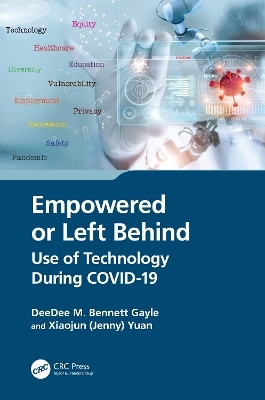
Empowered or Left Behind
CRC Press (Verlag)
978-1-032-33498-1 (ISBN)
Focused on the United States, this book summarizes the secondary impacts of COVID-19 due to the increased use of technology. Establishing the global response of social distancing, mandates for non-essential business, and working from home, the book centers on the disparate guidance provided domestically at the state and local levels. Marginalized populations are highlighted to identify areas where technology facilitated access and reach or contributed to difficulties catapulted by digital literacy or digital access issues. To explain how people may have been empowered or left behind due to a new and unique reliance on technology, this book is structured based on the social determinants of health domains. Specifically, this book explains how technology was an umbrella domain that impacted every aspect of life during the pandemic including access, use, adoption, digital literacy, and digital equity, as well as privacy and security concerns. Given this book’s focus on the impacts to marginalized populations, there is a thread throughout the book related to the use of technology to perpetuate hate, discrimination, racism, and xenophobic behaviors that emerged as a twin pandemic during COVID-19. Part I explains the defining differences between primary and secondary impacts, as well as the unique guidelines adopted in each state. Part II of the book is focused on specific domains, where each chapter is dedicated to topics including economic stability through employment, education, healthcare, and the social/community context through access to services. Part III focuses on unique technological considerations related to COVID-19, such as mobile health-related apps and privacy or security issues that may have posed barriers to the adoption and use of technology. Finally, the book ends with a conclusion chapter, which explicitly explains the advantages and disadvantages of technology adoption during COVID-19. These exposed benefits and challenges will have implications for policies, disaster management practices, and interdisciplinary research.
Dr. Bennett Gayle is an Associate Professor and Director of the Extreme Events, Social Equity, and Technology (E2SET) Lab in the College of Emergency Preparedness, Homeland Security, and Cybersecurity at the University at Albany, State University of New York. Her interdisciplinary research focuses on the individual and household disaster impacts for vulnerable populations and how technologies may be leveraged to increase resilience. She has secured research grants and contracts, including from the National Science Foundation, Federal Emergency Management Agency, and the Department of Homeland Security. With over fifty publications, work is published in various journals, and she has presented at several conferences related to disasters, disability, diversity, wireless technology, and future studies. She is co-editor of an edited book volume on information behavior. Dr. Bennett Gayle received her Ph.D. from Oklahoma State University in Fire and Emergency Management. She has a unique academic background having received both her M.S. in Public Policy and B.S. in Electrical Engineering from the Georgia Institute of Technology. Dr. Yuan is an Associate Professor and the Director of Human-Computer Interaction (HCI) Lab in the College of Emergency Preparedness, Homeland Security, and Cybersecurity at the University at Albany, State University of New York. Her research interests include both Human Computer Interaction and Information Retrieval, with the focus on user interface design and evaluation and human information behavior. Dr. Yuan has secured research grants and contracts from the Institute of Museum and Library Services, Department of Education in New York State and University at Albany. She published extensively in journals in information retrieval and human computer interaction, and conferences in computer science and information science, and is co-editor of the edited book volume Social Vulnerability to COVID-19: Impacts of Technology Adoption and Information Behavior in publication with Springer Nature Publishing. She serves an Editorial Board member of Aslib Journal of Information Management (AJIM) and Annual Review of Information Science and Technology (ARIST), and a Board member of the International Chinese Association of Human Computer Interaction. Dr. Yuan received her Ph.D. from Rutgers University at School of Communication and Information, Ph.D. from Chinese Academy of Sciences in Institute of Computing Technology. She received her M.S. in Statistics from Rutgers University and M.E. and B.E. in Computer Application from Xi’an University of Science & Technology in China.
Acknowledgment. About the Authors. Part I Government Response and Impacts. Chapter 1 Introduction: Primary and Secondary Effects of COVID-19. Chapter 2 COVID-19 US Response. Part II Technology Use across the Health Domains. Chapter 3 Businesses and Self-Employment. Chapter 4 Employment during COVID-19. Chapter 5 Education During COVID-19. Chapter 6 Access to Services and Resources. Chapter 7 Healthcare and Mental Health During COVID-19. Part III Unique COVID-19 Considerations and the Future Forward. Chapter 8 COVID-19 Mobile Applications. Chapter 9 Privacy and Security. Chapter 10 Conclusion. Index.
| Erscheinungsdatum | 20.07.2023 |
|---|---|
| Zusatzinfo | 6 Tables, black and white; 6 Line drawings, black and white; 1 Halftones, black and white; 7 Illustrations, black and white |
| Verlagsort | London |
| Sprache | englisch |
| Maße | 156 x 234 mm |
| Gewicht | 453 g |
| Themenwelt | Mathematik / Informatik ► Informatik ► Netzwerke |
| Informatik ► Software Entwicklung ► User Interfaces (HCI) | |
| Mathematik / Informatik ► Informatik ► Theorie / Studium | |
| Recht / Steuern ► Privatrecht / Bürgerliches Recht ► IT-Recht | |
| ISBN-10 | 1-032-33498-3 / 1032334983 |
| ISBN-13 | 978-1-032-33498-1 / 9781032334981 |
| Zustand | Neuware |
| Informationen gemäß Produktsicherheitsverordnung (GPSR) | |
| Haben Sie eine Frage zum Produkt? |
aus dem Bereich


